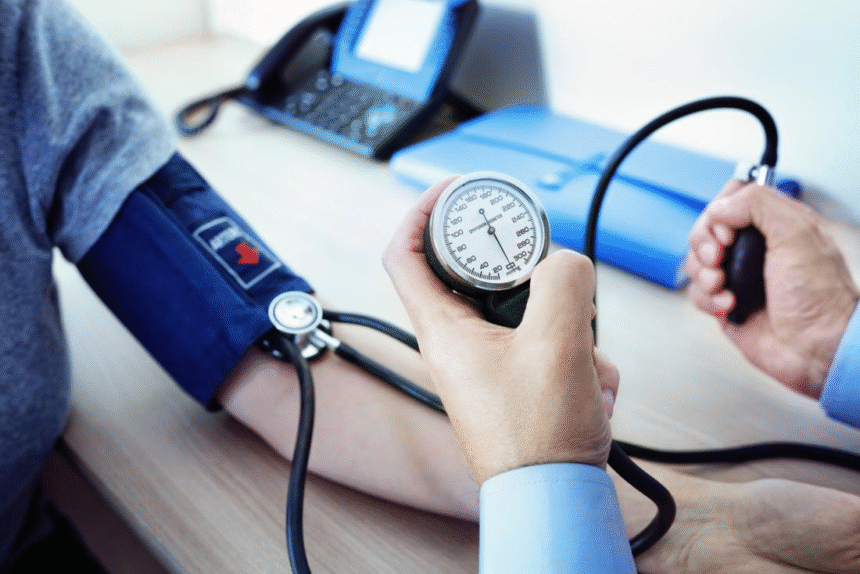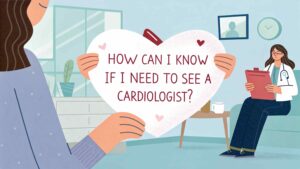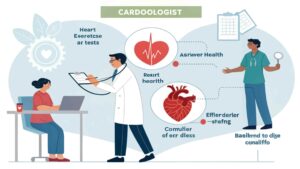Introduction
Blood pressure is one of the most vital indicators of heart and vascular health. It measures the force of blood pushing against artery walls as the heart pumps. Maintaining a normal blood pressure level is essential to prevent heart disease, stroke, and kidney problems. In cardiology, it plays a central role in diagnosis, treatment, and monitoring of almost every cardiovascular condition.
Understanding Blood Pressure Readings
Blood pressure is recorded with two numbers:
- Systolic pressure (top number): the pressure during heartbeats
- Diastolic pressure (bottom number): the pressure between beats
A normal reading is generally around 120/80 mmHg. Higher or lower readings can indicate potential problems with heart function or circulation.
Indicator of Cardiovascular Risk
High blood pressure (hypertension) is one of the biggest risk factors for:
- Heart attacks
- Strokes
- Heart failure
- Kidney damage
It damages arteries over time, making them less flexible and more prone to blockages. Cardiologists use blood pressure levels to assess a patient’s long-term risk of developing serious complications.
Role in Diagnosing Hypertension
One of the first things a cardiologist checks is your blood pressure. Persistent readings above 130/80 mmHg usually indicate hypertension. Left untreated, it silently causes harm without obvious symptoms. Early detection helps avoid long-term damage.
Monitoring Effectiveness of Treatment
Cardiologists regularly monitor blood pressure to evaluate how well treatment plans are working. If a patient is taking:
- Blood pressure medications
- Cholesterol-lowering drugs
- Lifestyle interventions (diet, exercise)
Then the cardiologist will use blood pressure trends to decide whether to adjust or maintain the current approach.
Blood Pressure and Heart Failure
High blood pressure increases the workload on the heart, causing the heart muscle to thicken or weaken over time. This can lead to heart failure. Managing blood pressure is crucial to:
- Reduce symptoms of fatigue and breathlessness
- Prevent fluid buildup
- Improve quality of life
Patients with heart failure must maintain optimal blood pressure levels to avoid worsening of the condition.
Impact on Arteries and Organs
Sustained high blood pressure damages the inner lining of arteries, leading to:
- Atherosclerosis (hardening and narrowing)
- Reduced blood supply to the heart and brain
- Increased risk of aneurysm or vessel rupture
It also strains organs like the kidneys and eyes, causing further complications if uncontrolled.
Importance in Stroke Prevention
Elevated blood pressure is the most significant modifiable risk factor for stroke. High pressure can lead to:
- Blood vessel rupture (hemorrhagic stroke)
- Blockage formation (ischemic stroke)
Cardiologists emphasize strict blood pressure control in patients with a history of stroke or high risk.
Blood Pressure in Special Populations
Blood pressure needs special attention in:
- Diabetic patients
- Pregnant women (to detect preeclampsia)
- Elderly individuals
- People with kidney disease
Cardiologists tailor blood pressure goals based on the patient’s overall condition, comorbidities, and risk profile.
Lifestyle Modification and Prevention
Cardiologists advise lifestyle changes as first-line strategies for managing blood pressure:
- Reducing salt intake
- Exercising regularly
- Managing stress
- Avoiding tobacco and alcohol
- Eating heart-healthy foods
These adjustments lower the risk of heart disease and are effective even without medications in many cases.
Blood Pressure During Emergencies
In emergency cases like heart attacks or strokes, blood pressure must be rapidly controlled. Uncontrolled spikes can:
- Worsen heart damage
- Delay recovery
- Increase risk of brain bleeding
Emergency physicians and cardiologists work together to stabilize patients using targeted therapies.
Conclusion
Blood pressure is a core focus in cardiology because it directly affects heart, brain, kidney, and overall vascular health. Whether it’s used for diagnosing hypertension, assessing treatment response, or preventing complications, maintaining optimal blood pressure is critical. Cardiologists monitor it closely and guide patients through medications, lifestyle changes, and regular follow-ups to keep it under control. Paying attention to your blood pressure can lead to a longer, healthier life.
FAQs
What is considered high blood pressure?
A reading consistently above 130/80 mmHg is considered high and requires medical attention.
Can high blood pressure cause heart attacks?
Yes, it increases the risk by damaging arteries and reducing blood flow to the heart muscle.
How often should blood pressure be checked?
At least once a year for healthy adults, and more frequently for people with heart conditions or risk factors.
Can blood pressure be controlled without medication?
Yes, many people control it with diet, exercise, stress reduction, and avoiding salt or alcohol.
Why is low blood pressure also a concern?
Extremely low blood pressure can lead to fainting, dizziness, and inadequate blood flow to vital organs.
















